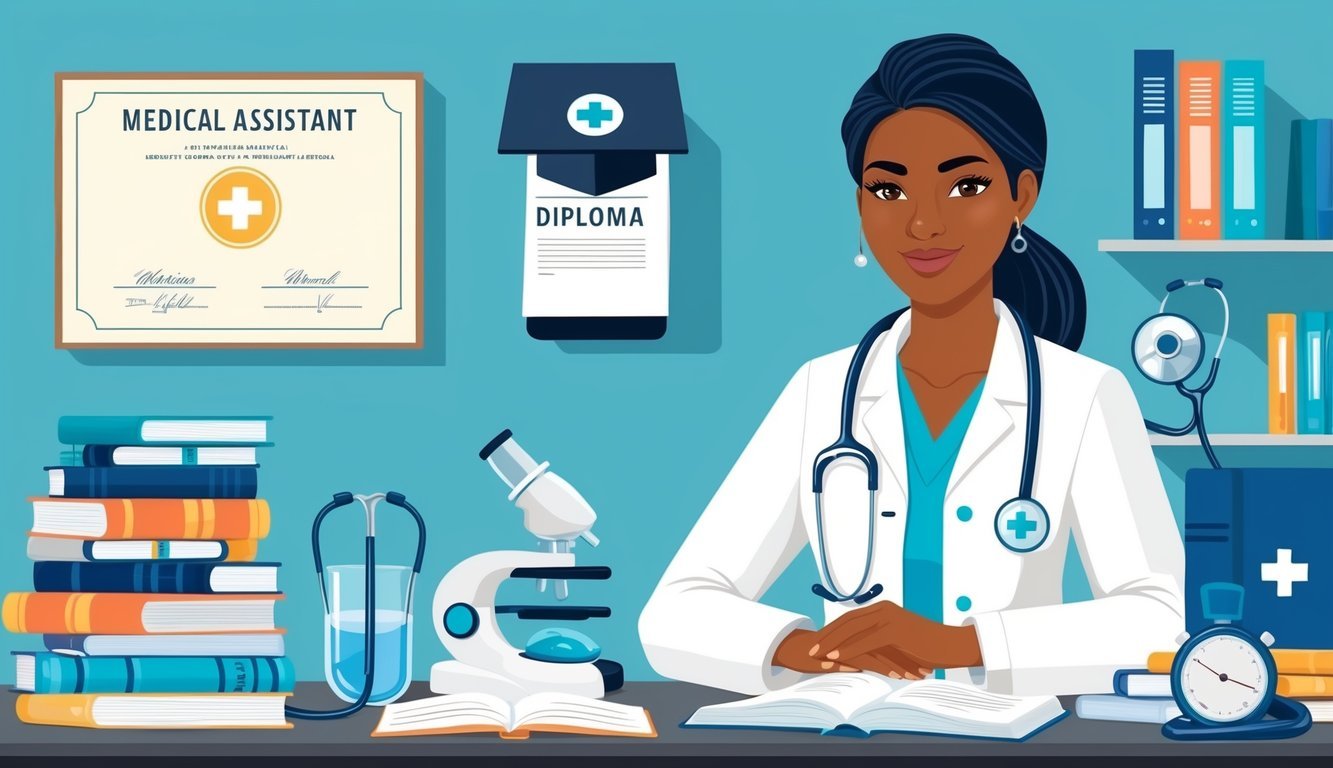The path to becoming a medical assistant often starts with earning a relevant degree.
A degree in medical assisting can provide you with the necessary skills and knowledge needed for this in-demand profession.
This often leads to better job opportunities and higher salaries.
Depending on your chosen program, you may complete a certificate, diploma, or even an associate degree, each offering varying levels of education and training.
Completing a formal education program equips you with vital clinical and administrative skills that are crucial for effectively supporting healthcare providers.
Many programs also offer hands-on training, which can enhance your practical experience and confidence in a clinical setting.
You can explore options at various institutions to find the best fit for your career aspirations.
Whether that’s through traditional programs or accredited online courses.
As you consider your options, understanding the specifics of each educational path will be important.
Programs differ in duration, cost, and the certification they prepare you for, so doing your research can help you make an informed decision.
For more information on accredited programs, you might explore resources like BestColleges or PracticalNursing.org.
Exploring the Role of a Medical Assistant
As a medical assistant, you play a vital role in the healthcare team by balancing both clinical and administrative responsibilities.
Your duties not only ensure effective patient care but also streamline healthcare processes.
Clinical Duties and Patient Care
In your clinical role, you perform essential tasks that support patient health.
These duties may include taking and recording vital signs such as blood pressure, pulse, and temperature.
You also assist physicians during examinations and procedures, ensuring that all necessary instruments are ready.
Patient care responsibilities include:
- Preparing patients for examinations.
- Collecting laboratory specimens.
- Administering medications as directed by a physician.
Your interactions with patients are crucial, as you often serve as the first point of contact.
Strong communication skills are essential for explaining procedures and addressing patient concerns.
Administrative Responsibilities
Your administrative tasks are equally important in maintaining efficient healthcare operations.
You manage medical records, ensuring that patient information is accurate and up to date.
This often involves entering data into electronic health record (EHR) systems.
Key administrative duties include:
- Scheduling appointments for patients.
- Handling billing and insurance claims.
- Coordinating follow-up care.
These responsibilities require attention to detail and organizational skills.
By effectively managing these tasks, you contribute to better patient experiences and help healthcare professionals focus on providing care.
Healthcare Settings and Job Security
Medical assistants work in various healthcare settings, including hospitals, clinics, and private practices.
This diversity enhances your employment opportunities.
According to the U.S. Bureau of Labor Statistics, the demand for medical assistants is expected to grow significantly over the next decade, contributing to job security.
Common settings where you may find employment include:
- Outpatient care centers.
- Physician’s offices.
- Specialty clinics.
This growth is driven by the increasing healthcare needs of an aging population and advancements in medical technology.
As you gain experience and pursue further education, you can explore additional career pathways within this expanding field.
For more information, visit Nurse.org.
Educational Pathways

Choosing the right educational pathway for becoming a medical assistant involves understanding the various options available.
Each pathway has unique advantages that align with your career goals and timeline.
High School Preparation and Prerequisites
To become a medical assistant, you need a high school diploma or GED.
This foundational education equips you with critical skills necessary for further training.
High school courses in subjects like biology, health sciences, and computer applications can be beneficial.
They prepare you for the specific requirements of medical assisting programs.
Additionally, some vocational schools offer programs that allow you to gain hands-on experience while completing your high school education.
This can provide an edge when transitioning to an accredited medical assisting program.
Certificate vs. Associate Degree
When considering a career as a medical assistant, you can choose between a certificate program and an associate degree.
Certificate programs generally take 6 months to a year to complete and focus on essential medical assistant skills.
These programs often include clinical training and prepare you for entry-level positions.
Associate degree programs typically take two years to complete.
They offer a more in-depth education, covering topics such as patient care, medical ethics, and pharmacology.
Many community colleges and vocational schools offer these degrees, providing a comprehensive approach to medical assisting.
Each option can lead to certification, which enhances your employment opportunities.
Online and On-Campus Programs
Flexibility in education is critical, and you have the option to pursue online and on-campus programs for medical assisting.
Online medical assistant programs are ideal if you require a more adaptable schedule.
They allow you to complete coursework remotely, with many schools offering practical components in local healthcare settings.
This convenience does not compromise the quality of education.
Conversely, traditional on-campus programs provide direct interaction with instructors and peers.
This format can foster networking opportunities and hands-on experiences that are crucial for your training.
Both options cater to varying learning styles and personal commitments, ensuring you can find a program that suits your needs.
Certification and Accreditation

Certification and accreditation play crucial roles in advancing your career as a medical assistant.
These processes ensure you meet the standards of the profession and enhance your employability.
Understanding certification exams, recognized accrediting bodies, and the importance of accredited programs can guide your path to success.
Certification Exams and Credentials
To become a certified medical assistant (CMA), you must pass a certification exam.
The most recognized certification is offered by the American Association of Medical Assistants (AAMA).
Other options include the Registered Medical Assistant (RMA) credential from the National Healthcareer Association (NHA) and the Certified Clinical Medical Assistant (CCMA).
Here’s a brief overview of key certifying bodies:
| Certification | Certifying Body | Requirements |
|---|---|---|
| CMA | AAMA | Accredited program + exam |
| RMA | NHA | Accredited program or work experience |
| CCMA | NHA | Accredited program or work experience |
Each credential has specific eligibility requirements, so review them closely before enrolling in a training program.
Accrediting Bodies and Accredited Programs
Accreditation is vital in ensuring the quality of your medical assisting program.
Recognized accrediting bodies, such as the Commission on Accreditation of Allied Health Education Programs (CAAHEP) and the Accreditation Bureau of Health Education Schools (ABHES), evaluate programs based on established standards.
Choosing an accredited program ensures your education meets industry expectations.
Employers often prefer candidates from accredited programs, as this signifies a commitment to professional training.
Be sure to verify the accreditation status of any medical assistant program you consider.
Importance of Accreditation in Medical Assisting
Accreditation is more than just a stamp of approval; it directly affects your career prospects.
Employers look for candidates from accredited programs because it signals quality education and training.
Accredited programs often provide better preparation for certification exams.
Additionally, attending an accredited institution can be essential for financial aid eligibility.
Many funding sources require enrollment in an accredited program for loans and grants.
Thus, prioritizing accredited education can significantly impact your success in the field of medical assisting.
Skills Development and Specialization

Developing specific skills is crucial for your role as a medical assistant.
Focusing on key areas such as anatomy, specialized procedures, and medical law not only enhances your expertise but also improves patient care and clinical outcomes.
Anatomy, Physiology, and Medical Terminology
A solid understanding of anatomy and physiology is essential in your role.
You should know how human systems function and their interactions.
This knowledge enables you to assess patient conditions accurately.
Additionally, mastering medical terminology is critical.
It allows you to communicate effectively with healthcare professionals and document patient information correctly.
Consider these key terms:
| Term | Description |
|---|---|
| Vital Signs | Measurements that reflect a patient’s essential functions. |
| Pharmacology | The study of drugs and their effects on the body. |
These elements not only aid in patient care but also are foundational for further specialization in areas like phlebotomy or clinical medical assisting.
Specialized Clinical Procedures
As you pursue specialization, gaining proficiency in various clinical procedures becomes important.
This may include skills like phlebotomy, administering injections, and performing EKGs.
Being adept in these skills enhances your capability to support patient care effectively.
Some specialized procedures you might focus on include:
- Phlebotomy: Drawing blood for tests and treatment.
- Injections: Administering medications through various methods.
- EKG Readings: Monitoring heart activity through electrocardiograms.
These skills not only make you an asset to your medical team but also improve your career advancement opportunities.
Medical Law, Ethics, and Record-Keeping
Understanding medical law and ethics is crucial to your practice.
You must adhere to legal standards and ethical guidelines to protect both yourself and your patients.
You should be well-versed in topics like:
- Patient confidentiality under HIPAA
- Informed consent and patient rights
- Documentation standards for medical records
Proper record-keeping is a key responsibility.
Accurate notes will ensure continuity of care and compliance with legal requirements.
Leveraging your knowledge in these areas can lead to increased trust from both patients and employers.
Career Advancement and the Job Market

In the field of medical assisting, career advancement and job market dynamics play a crucial role in shaping your professional journey.
Understanding networking opportunities, gaining practical experience through externships and internships, and keeping an eye on job prospects and salary expectations are essential for achieving your career goals.
Networking and Professional Development
Building a strong professional network is vital for your career as a medical assistant.
Networking can lead to mentorship opportunities, job openings, and professional connections within the healthcare industry.
Attend industry events, workshops, and seminars to meet peers and experienced professionals.
Consider joining organizations such as the American Association of Medical Assistants (AAMA) or local healthcare associations.
These groups often offer resources for continuing education and professional growth, which can enhance your credentials and make you a more competitive candidate.
Externships, Internships, and On-the-Job Training
Gaining hands-on experience through externships or internships is important for your development as a medical assistant.
Many medical assistant programs include these placements, allowing you to apply classroom knowledge in real-world settings.
This type of practical experience not only strengthens your resume but also helps you build relationships in the industry.
On-the-job training is another avenue to enhance your skills.
Many employers prefer candidates with real-life experience, making externships or internships valuable.
These experiences provide insight into various medical assistant roles, enabling you to identify your specific areas of interest.
Job Prospects and Salary Expectations
According to the Bureau of Labor Statistics, medical assistants are projected to have significantly growing job opportunities.
This is driven by an aging population and increased healthcare needs.
As of 2023, the median salary for medical assistants is around $38,000 per year.
There is potential for growth as you gain experience and additional certifications.
Specializing in specific areas of healthcare, such as pediatrics or cardiology, can also increase your job prospects and salary potential.
With the right combination of networking, practical experience, and continuous education, you can position yourself for a successful career in this dynamic field.

